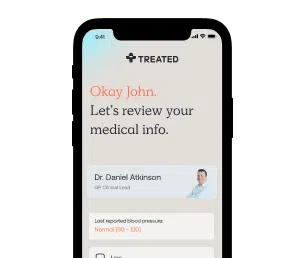Malaria prevention
Tablets to help you stay protected.
Secure delivery
UK clinicians
Malaria is a deadly illness that’s spread through mosquito bites that can cause symptoms like fever, vomiting and diarrhoea.
Taking antimalarial treatments when you travel can provide effective protection from malaria. Order malaria prevention treatments online with Treated and get expert help and advice.
When an infected mosquito bites you, it can pass a parasite onto you. There are five parasites that can cause malaria, but most cases are caused by just two: Plasmodium falciparum and Plasmodium vivax .
The vast majority of malaria cases occur in Africa. Only 6% of cases occur in countries on other continents . After a bite from an infected mosquito, the Plasmodium parasites use your bloodstream to go into your liver. Once there, they grow and mature until they’re ready to reproduce. Then they return to your bloodstream where they infect your red blood cells and multiply. Every two or three days the infected blood cells burst, releasing more parasites into your bloodstream to repeat the cycle .
Most people with malaria get better if they’re diagnosed and treated early. Malaria can be fatal without treatment, and approximately 86% of people worldwide who die from malaria are younger than five years old.
There are treatments that prevent malaria when taken prophylactically (pre-emptively). People who travel to places where malaria is endemic often take these drugs. When taken as directed by your clinician, malaria prevention treatments should keep you from getting malaria even if you get bitten by an infected mosquito.
Anopheles mosquitoes transmit malaria in over 100 countries across the world . Anyone who travels to an area with active malaria transmission should consider using preventive treatment. These areas often include countries in Africa, parts of the Middle East, and Central and South America.
Preventing malaria is easier than treating it. If you’re planning to travel internationally, you can use the FitForTravel and the CDC Malaria Database
to see if there’s malaria transmission where you’re going, and make sure you speak to a clinician to get a prescription for antimalarial treatment before you go.
Despite increasing efforts to limit the spread of malaria, it still remains a common infection.
About 229 million people were infected with malaria in 2019, and 409,000 of them died . Some areas have much higher rates of transmission than others. Malaria infections in African countries account for 94% of cases worldwide .

How we source info.
When we present you with stats, data, opinion or a consensus, we’ll tell you where this came from. And we’ll only present data as clinically reliable if it’s come from a reputable source, such as a state or government-funded health body, a peer-reviewed medical journal, or a recognised analytics or data body. Read more in our editorial policy.
Malaria is caused by being bitten by an Anopheles mosquito that has been infected with Plasmodium parasites. Once you’ve been bitten, the parasite travels to your liver to mature and release merozoites, which are a different form of the parasite.
These merozoites enter your bloodstream, where they infect and destroy red blood cells . As malaria progresses, the symptoms can become more severe.
Shortly after infection, there aren’t that many symptoms of malaria. In fact, it can lie dormant for weeks or months. In some very rare cases, it can be years before you start noticing any strong symptoms . When someone becomes symptomatic, they can experience:
The earliest someone might experience symptoms is around 10 days after a mosquito bit them .
Untreated malaria can be fatal, or at least lead to serious complications. Without treatment, you could develop: pulmonary edema, cerebral malaria, kidney failure, bleeding or severe anemia .

How we source info.
When we present you with stats, data, opinion or a consensus, we’ll tell you where this came from. And we’ll only present data as clinically reliable if it’s come from a reputable source, such as a state or government-funded health body, a peer-reviewed medical journal, or a recognised analytics or data body. Read more in our editorial policy.

How we source info.
When we present you with stats, data, opinion or a consensus, we’ll tell you where this came from. And we’ll only present data as clinically reliable if it’s come from a reputable source, such as a state or government-funded health body, a peer-reviewed medical journal, or a recognised analytics or data body. Read more in our editorial policy.
Have something specific you want to know? Search our info below, or ask our experts a question if you can’t find what you’re looking for.
Malaria. Who.int. https://www.who.int/news-room/fact-sheets/detail/malaria
Malaria: MedlinePlus Medical Encyclopedia. https://medlineplus.gov/ency/article/000621.htm
Malaria in Children. Mediterranean Journal of Hematology and Infectious Diseases, 4(1). https://www.ncbi.nlm.nih.gov/pmc/articles/PMC3507524/
Severe long-delayed malaria caused by Plasmodium malariae in an elderly French patient. Malaria Journal, 20(1).
CDC - Malaria - About Malaria - FAQs. Centers for Disease Control and Prevention. https://www.cdc.gov/malaria/about/faqs.html
Clinical review: Severe Malaria. Critical Care, 7(4), p.315. https://www.ncbi.nlm.nih.gov/pmc/articles/PMC270697/
CDC - Malaria - Travelers - Choosing a Drug to Prevent Malaria. https://www.cdc.gov/malaria/travelers/drugs.html
CDC - Malaria - About Malaria - Where Malaria Occurs

Like Malarone, but doesn't need a prescription. Start two days before you enter a malaria risk zone.

Take two days before travel to prevent malaria, and for one month after you return.

Like Malarone, but generic. A daily tablet that you start two days before travelling to prevent malaria.

Contains two medicines to help prevent and fight malaria. Start taking it one week before travelling to a malaria-risk zone.

Registered with GMC (No. 4624794)
Meet Daniel
Registered with GPhC (No. 2202465)
Meet Sanjeda
Registered with GPhC (No. 2070724)
Meet Craig
Always read the leaflet that comes with your medication and tell us about any side effects you get.
We know health, but you know you.
Our experts tell you what’s safe, but you decide what’s best.
Answer a few questions and tell us about yourself. Get tailored advice from our clinicians so you can choose better.

Choose your treatment and how often you have it delivered.

We know things change. It’s the nature of life. We’ll check in regularly to make sure your treatment is still right for you.
Pause. Change. Skip. Start again. Any time you like.
Here are some other things we can help with.
Choose from our range of tablets and solutions. Get ongoing care and support from our experts.
Stop smoking treatments that can help you kick the habit forever, and reduce your risk of disease.
Tablets or injections. Tailored weight loss treatments combined with ongoing support from our experts.
We're making healthcare more about you. Sign up to our newsletter for personalised health articles that make a difference.
Disclaimer: The information provided on this page is not a substitute for professional medical advice, diagnosis, or treatment. If you have any questions or concerns about your health, please talk to a doctor.
We couldn't find what you're looking for.
Here's everything we treat. Or, if you're looking for something we don't have yet, you can suggest something.
If there’s a particular treatment or condition you’re looking for, tell us and we’ll look into it for you.
Submit your question here, or tell us if you’ve found an issue on our site.
We’ll get back to you very soon. We aim to respond to all queries in one working day.
You’re signed up to our newsletter. Keep an eye on your inbox for our latest update.
By clicking 'Subscribe now' you're agreeing to our Privacy Policy.
We’ve sent you an email asking you to confirm your email address.